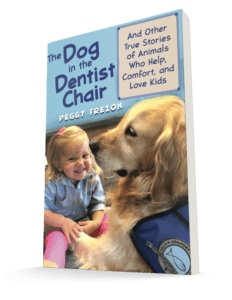We are participating in the Caring For Critters Round Robin hosted by Heart Like a Dog. Caring for Critters is where you can read about pet parents’ experiences with various health concerns to gain insight and hope for issues you may face.
Super Seniors
I share my home with senior dogs–Kelly, a 13-year-old spaniel-mix and Ike, a 9-year-old golden retriever. We find we love the wisdom and slower pace of the seniors. There are, however, some health concerns that come along with it, too.
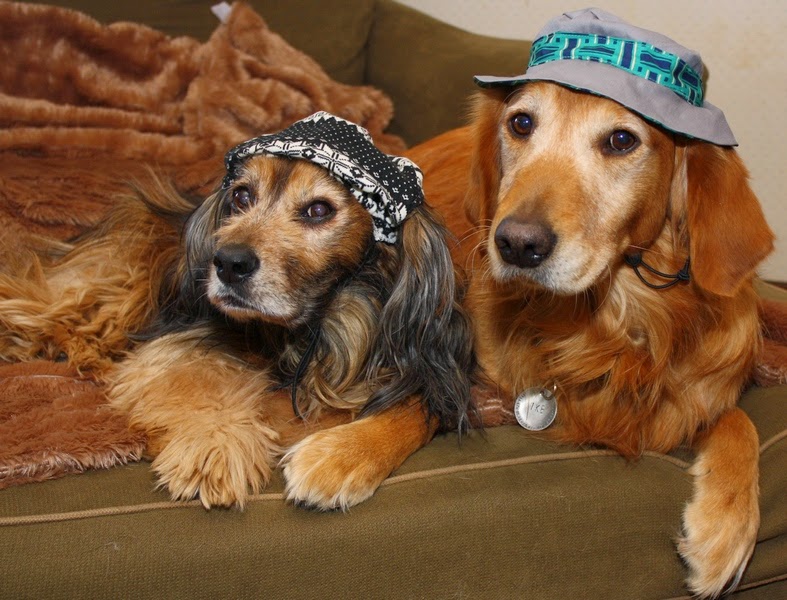 |
| Kelly and Ike have good fashion sense! |
Always Hot and Thirsty
Kelly is 13, but she’s really spry, and loves to jump onto furniture and run in the yard. Sometimes, however, Kelly gets on these jags where she can’t get enough water. She drains her water bowl dry, and a few hours later will do it again. In addition, she pants a lot, even when it seems comfortably cool in the house. At first I thought she might have diabetes. But her bloodwork for that was fine. What it did reveal, however, was risk factors that led the vet to diagnose Cushing’s Disease. This disease is often found in older dogs, and has to do with the adrenal glands. Here are some symptoms:
increased thirst
increased urination
increased appetite
excessive panting
lethargy
hair loss
Kelly has all but the hair loss and lethargy. The vet will be conducting some more bloodwork to make a conclusive diagnosis. The disease can be managed with medication. Right now Kelly is doing very well. Her doctor will keep an eye on the illness.
 |
| Just a few gray hairs to show for her age. |
Gotta Go, Gotta Go, Gotta Go
Standing up became difficult for our 11-year-old Dalmatian, Schuyler. He slept in the kitchen because he could no longer manage the stairs up to the bedroom. One morning I came downstairs and found him lying in a puddle of urine and feces. Shocked, I started to scold him. He was old enough to know better! But immediately, I saw the hurt in his eyes. He couldn’t help it. He’d become incontinent. I gently cleaned up the mess while talking to Schuyler in soft, reassuring tones. I helped him outside and we walked slowly in the grass together. We dealt with Schuyler’s incontinence for more than a year, as long as the veterinarian said he wasn’t in pain and was otherwise suffering. I cleaned his fur and hugged him and told him how much he was loved. Here is what worked for us:
1. Take him outside more frequently during the day
2. Confine him to the kitchen at night, so clean up is easier
3. Give him a nice, soft, comfortable bed with a washable cover. We had two covers to switch out when one was in the wash.
4. Keep regular visits with the veterinarian to assess his overall health and pain level, if any.
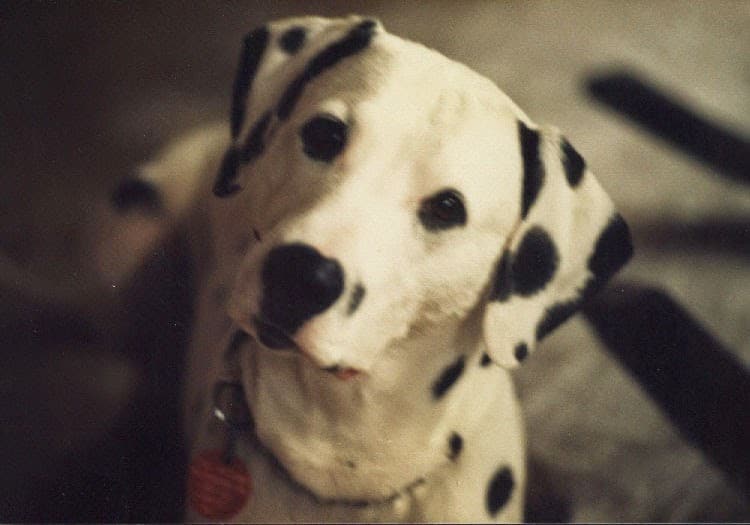 |
| Schuyler was our first dog. |
What You See May Not be What You Get
All
of our senior dogs have had some degree of achy joints or arthritis.
We’ve bought big, comfortable orthopedic beds, and increased exercise
where appropriate, and at times used prescriptions from our
veterinarian. But there was one time when the symptoms seem to point to
joint pain, but the problem actually was something else.
We
adopted Brooks, a lovely, large, gentle golden retriever, when he was
11 years old. He had a beautiful, slow pace of life and responded to the
softest word. “Brooksy, come here,” I’d say, and the next thing I knew,
he’d be in my lap. He was my constant companion. Nearly a year after we
adopted Brooks, I noticed that all of a sudden, he didn’t want to sit
or lie down. He just stood, staring off into space. The next day, he abruptly stood up in the middle of the night.
He didn’t bark or cry in pain, he just stood. We brought him to the
veterinarian, assuming he had something wrong with his hips or joints.
Unfortunately, this did not turn out to be the case. The x-rays revealed
that he was full of cancer. We were glad that we investigated the situation further, and not just assumed it was the most obvious conclusion.
 |
| Brooks enjoyed the outdoors. |
Cancer
Everyone’s experience with cancer is so different.
When Brooks was diagnosed with cancer, he was given 4 to 8 weeks to live. A few days before this, he’d had no symptoms, was breathing without trouble (even though his lungs were full of dozens of tumors), was eating and relieving himself without problem. We brought him home from his appointment and it seemed as if his ability to move decreased by the hour. My husband made a ramp out of a plank to help him get down the back steps, but he wouldn’t get on it. The next day Mike stayed home from work to be with Brooks. At one point Brooks seemed to indicate that he wanted to take a walk. The three of us went outside and wandered down the street. Brooks moved very slowly, but seemed to enjoy every smell, lifting his head and catching an aroma in the air, nosing the ground. We didn’t go far, but he enjoyed that walk. We spent the whole day loving him and being together. That evening he slept with his head on Mike’s feet. Then, he stood up and started thrashing, his mouth foaming, biting at the furniture. He was having a grand mal seizure. I was afraid that he might accidentally bite us. He clearly wasn’t himself. We somehow got him outside, away from Kelly who was anxious and confused by the seizure. The seizure ended and he collapsed into sleep. Then it happened again, and again. We covered him with blankets to keep him warm. Our son came over to help us get an 80-lb seizing dog into the car to transport to the emergency vet. Poor Brooks. The vet explained that the cancer had probably spread to his brain. Given his age, and the extent of the cancer, there was no hope. I stayed with him for a long time before I could consent to having his suffering ended.
He was a good boy.
As sad as it was, and still is, I don’t for one second regret adopting a senior dog.
Cancer may be treated with radiation, amputation, medication. Some dogs recover and do well. We can’t live in fear of cancer. Or any illness. Take good care of your dog and shower him love and attention every day. Make each day the best.
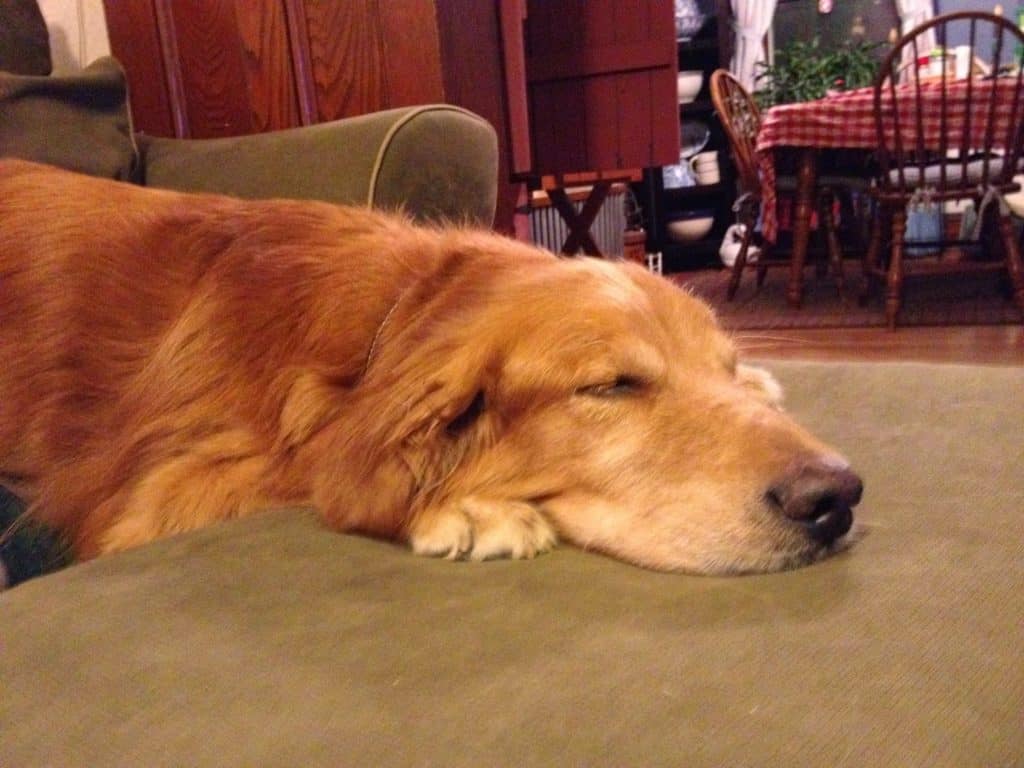 |
| Brooks fell asleep just about anywhere! |
Slow and Easy
Ike is 9 years old–a senior dog, but not quite geriatric. He’s got white spectacles. He has some allergies. He doesn’t move so fast. He gets tired after fetching the ball 3 or 4 times. He needs a little boost to climb into the car. His teeth are worn and need a cleaning. He’s had some health concerns–his heart rate is too slow. His digestion is sensitive. But overall, Ike’s a super senior and doing great!
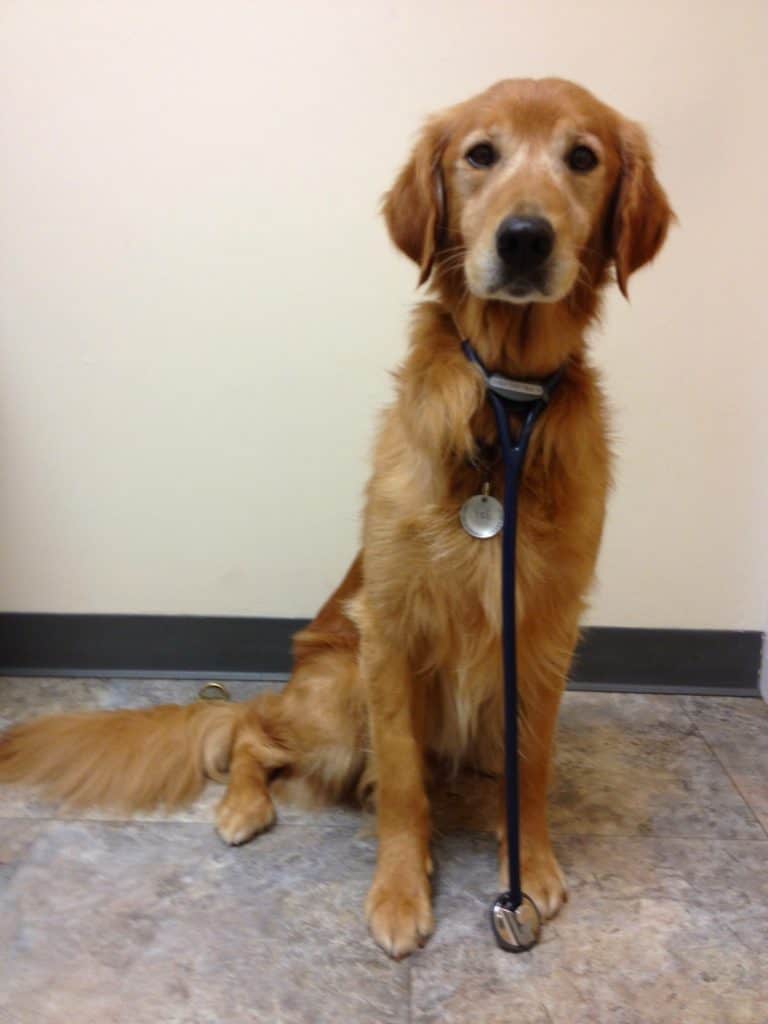 |
| Dr. Ike at your service. |
This is only my experience. Please keep in mind that this is not advice on how to heal your pet, it’s just what worked and what didn’t work for us. As always, please consult your vet before making any health decisions for your pets.
Tomorrow, please visit The Hailey and Zaphod Chronicles to learn about auto-immune disorder, specifically, immune mediated hepatitis causing cirrhosis of the liver.
And see the entire list of posts here on Caring for Critters community page.


